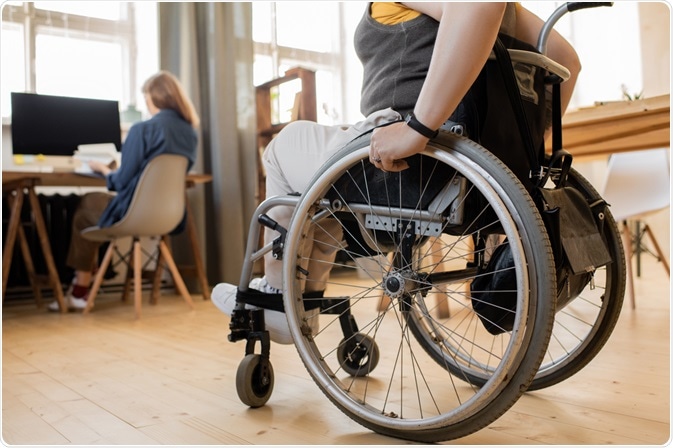Paralysis is caused by multiple conditions, which may be classified as those which affect the muscles themselves, and those which act indirectly, through the nerves that control muscle action. The most common external causes for paralysis include the occurrence of a stroke, head injury, spinal cord injury and multiple sclerosis.

Image Credit: Pressmaster / Shutterstock
The most important causes of paralysis are:
Myopathy
Conditions that cause paralysis by directly inducing muscle weakness include:
- Congenital diseases, mostly genetic, that cause muscle impairment, such as muscular dystrophy.
- Inflammatory or autoimmune conditions of muscle inflammation, such as dermatomyositis and polymyositis.
- Drug-induced myopathy, as following statin or steroid treatment.
- Myopathy following alcohol abuse.
- Post-viral myositis.
Neuropathy
Neurological causes may be due to disease, toxicity, or injury to one or more nerves.
-
- Focal nerve injury causes paralysis of the muscle supplied by that nerve.
- Peripheral neuropathy is seen in conditions like:
- Amyotrophic lateral sclerosis
- Bell’s palsy
- Vitamin B12 deficiency
- Diphtheria
- Heavy metal poisoning
- Snakebite
- Focal mononeuropathy
- Paralysis at the neuromuscular junction occurs in:
- Botulism
- Guillain-Barre syndrome, which is associated with viral infections, either by direct viral damage to the nerves or as a result of hyperimmune responses to the viral antigens.
- Myasthenia gravis
- Lyme’s disease
- Organophosphate poisoning, which paralyzes nerve conduction.
Injury or disease of the spinal cord, or acute myelopathy
Such conditions include:
- Diseases that affect the anterior spinal horn cells:
- Polio affecting anterior horn cells
- Vaccine-associated paralytic polio
- Infections by some enteroviruses
- Cord compression
- Tumors of the spinal cord
- Spinal trauma
- Abscesses, hematomas or hamartomas, with thrombosis or hemorrhage.
- Demyelinating diseases
- Multiple sclerosis, a neuroinflammatory condition where axonal myelin is stripped away in patches, leading to poor nerve conduction.
- Transverse myelitis, which is an inflammation of one or more segments of the spinal cord, caused by a direct viral infection, or post-infective immune complications. Viruses that may cause transverse myelitis include herpes simplex, varicella and Epstein-Barr viruses.
- Acute disseminated encephalomyelitis
- Spinal trauma or ischemia, due to anterior spinal artery syndrome, or due to complications arising during or surrounding the period of surgery.
- Spinal deformity, such as spina bifida, which is a congenital abnormality of the central nervous system, and causes paralysis of the lower limbs in many cases.
Diseases of the brain
The brain controls all voluntary muscle contraction. Diseases of the brain which result in paralysis include:
- Stroke, which is due to an interruption of the blood supply to part of the brain, either because of a leak or rupture of a blood vessel or due to a block in a vessel by a clot.
- Traumatic brain injury
- Tumors that press upon or invade neighboring brain tissue.
- Cerebral palsy which is due to a brain injury suffered in the peripartum period.
Systemic conditions
Some diseases are not primarily neurological but include paralytic manifestations. These include:
- Acute porphyria
- Paralysis of critical illness
- Paralytic shellfish poisoning, due to saxitoxin toxicity.
- Periodic paralysis due to ion-channel inactivation leading to inexcitability of the neurons.
- Friedrich’s ataxia
References
Further Reading
Last Updated: Nov 4, 2022